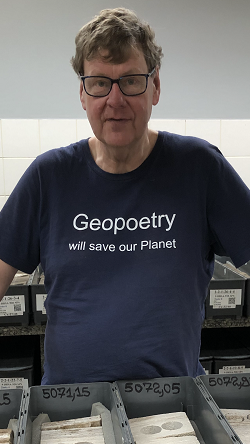Corbett, P., Why Geopoetry? Geoscientist
30 (4), 8, 2020
https://doi.org/doi: 10.1144/geosci2019-079,
Download the pdf here
Geology is too important to be left to geologists, argues Patrick Corbett
 We’re used to hearing that the planet is under threat, but what does that really mean? The planet itself is surely safe – what is under threat are species and people. We can try our best to control geological processes, but – as we are constantly reminded by events like flooding, earthquakes, tsunamis and sea level change – it seems the geology is always in charge.
We’re used to hearing that the planet is under threat, but what does that really mean? The planet itself is surely safe – what is under threat are species and people. We can try our best to control geological processes, but – as we are constantly reminded by events like flooding, earthquakes, tsunamis and sea level change – it seems the geology is always in charge.
So why don’t people appreciate this more? It may be that they don’t read textbooks, and I doubt this will change. The answer is perhaps that we need more use of the poetry of geoscience – or geopoetry. Poems ‘make one feel, but also understand. They inspire and upset, they provoke and reflect’ (Parkinson, 2019).
Geology in poetry
Geology and geologists have featured in poetry for centuries. William Wordsworth’s poem Excursion (1814) contains an early reference to the geologist in the lines ‘He who with pocket-hammer smites the edge/of luckless rock or prominent stone, disguised/In weather stains or crusted o’er by Nature/The substance classes by some barbarous name/and thinks himself enriched,/Wealthier and doubtless wiser than before.’
The late 19th Century saw a flowering of geopoetry at a time when debates between scientists and artists were commonplace. Whilst poets such as Keats worried that science would ‘steal away some of the magic from the world’ (Illingworth, 2019), the geologist was clearly entering the consciousness – perhaps following on from the creation of the Geological Society of London in 1807.
That interest hasn’t waned. For example, Mike Stephenson has visited the Yorkshire sites that inspired Ted Hughes, and knowledge of geology as well as poetry draws out new meaning in some of his poems. Hughes’s take on Millstone Grit is perhaps captured in the lines ‘… big animal of rock’ and ‘…kneeling in the cemetery of its ancestors’.
And Sarah Acton notes in reflections of our totemic Jurassic Coast (Acton, 2017): ‘this cliff is lone ranger, our frontier messenger/carrying DNA for earth revival, should/the next extinction allow survival’.
Geopoetry 2020
Discussion between scientists and artists took centre stage at a 2011 Geological Society event, ‘Poetry and Geology: A Celebration.’ The Society, in conjunction with the Central Scotland Group, is currently organising ‘Geopoetry 2020’ with the Scottish Poetry Library and the Edinburgh Geological Society, to be held on 1 October.
Geopoetry 2020 is an opportunity for all those interested in geology and poetry to get together to discuss the interplay between the two. Coming before COP26 in Glasgow (assuming both are able to go ahead in these uncertain times), it would be nice to see submissions to the former that could also be presented as part of the latter, to enable reflection on geologists’ feelings for our planet. Poetry and geological sciences have drifted apart – is it time for a reconvergence?
A Geopoetic future
Poetry is an opportunity to communicate with a wider group of people in different forums. Geologists must enter this space, for fear of missing out. What reaches people is not the weighty technical details of lithology, stratigraphy, taxonomy, sedimentology, geomechanics, geochemistry – but fears of the underworld, love of birds, care for the planet. Few can possibly be interested in whether Top Palaeocene is 56.6 or 55.5 Mya – but they might be interested in the origins of the Palaeo-Eocene Maximum. Whilst poets write on the Anthropocene, geologists work globally to define its precise start date.
Wake up, fellow geologists – the wider public is worried about the planet. We must learn to communicate better in their language, not just in ours.
Patrick Corbett is Heriot-Watt University Poet for 2020 and welcomes geopoetic contributions ([email protected]).
A fuller version of this article, ‘Why Geopoetry?’ can be read online
Geopoetry 2020 is due to take place on 1 October 2020 at the Edinburgh Poetry Library. Submissions are open until 31 May 2020 – for further information, please visit www.geolsoc.org.uk/geopoetry20.
References:
Acton, Sarah ‘Jurassic Coast Poems, Black Ven Press 2017
Illingworth, Sam, ‘A Sonnet to Science’, Manchester University Press 2019
Parkinson, Hannah Jane, ‘From Keats to Merseybeat: A retreat into my favourite verse is a soul saver’, The Guardian Online, 6 December 2019